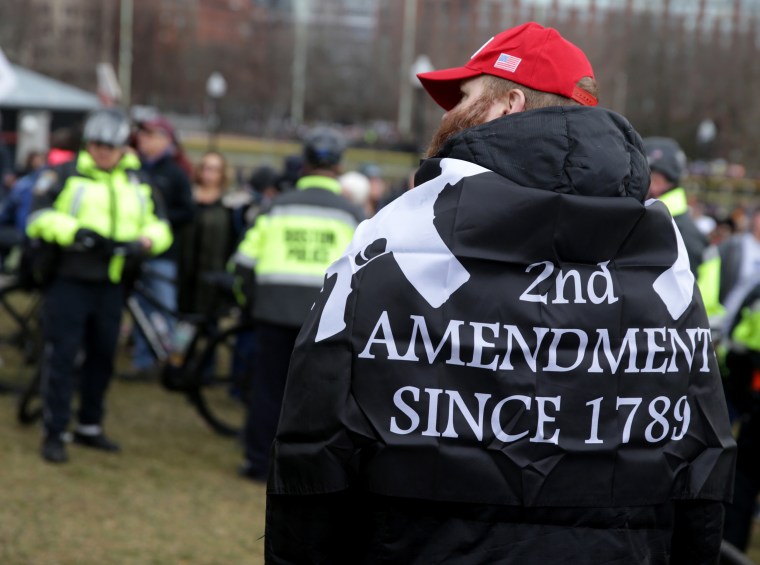Every successful constitutional amendment covering the rights of Americans — save the failed Prohibition effort — has been about expanding, not limiting, those rights. (It is, after all, called the Bill of Rights, not the Bill of Fewer Rights.)
Which is why the recent calls to repeal the Second Amendment right to bear arms is unlikely to succeed: The idea that a significant proportion of this country’s political leaders would act to end one of the original protections enshrined in the Bill of Rights is foolish and, for those interested in increasing gun control, completely counterproductive. Acting to end this right will likely result in more support for it, from surprising quarters.
I know from experience: In 2004, I was one of a handful of conservatives who lobbied against the Federal Marriage Amendment proposed by then President George W. Bush, which would have made same sex marriage unconstitutional under federal law.
The push for a Federal Marriage Amendment made it clear that backers of the effort weren’t interested in “protecting marriage” but in limiting the rights of other Americans.
While Americans weren’t yet there on same-sex marriage in 2004 — in the spring of 2004, only 42 percent of Americans favored marriage equality and, by the summer of 2005, that number had dipped to just 37 percent — the idea of using the constitution to limit the rights of other Americans was even less palatable.
The overreach of opponents of same-sex marriage had the unintended consequence of actually moving public opinion in favor of marriage equality: Almost two-thirds of Americans support it today. The push for a Federal Marriage Amendment made it clear that backers of the effort weren’t interested in “protecting marriage” but in limiting the rights of other Americans.
Gun control supporters can and should expect the same should they accept the challenge made in an oped in The New York Times by former Supreme Court Justice John Paul Stevens.
With public opinion at your back, a constitutional amendment is a Herculean effort but, when public opinion is strongly against you, it is a complete and total waste of time.
He argued that, in the wake of the landmark District of Columbia v. Heller decision enshrining the individual right to gun ownership in constitutional law in 2008, the “simplest” way to deal with the issue of gun control is to simply repeal the Second Amendment. But, he spends no time whatsoever, outside of describing such an effort as “simple but dramatic action,” in the piece explaining how such an effort would succeed. He fails to spend time talking about how pass an amendment stripping Americans of their constitutional right to bear arms because it’s basically impossible.
Amending the United States Constitution is an almost Herculean task: Short of a constitutional convention called by the states (which has never occurred in our history), repealing the Second Amendment would require that Congress propose an amendment, pass it in both the House and Senate with a two-thirds majority, and then get it ratified by three-quarters of the states.
The Federal Marriage Amendment (against which I helped lobby in 2004) never even made it past the proposal stage despite public opinion opposing marriage equality. It came up far short of the two-thirds required in the House and in the Senate, and in fact failed to even muster a simply majority in the Senate.
Practically speaking, any effort to try and repeal the Second Amendment is dead on arrival. But politically speaking, the effort would be political suicide.
With public opinion at your back, a constitutional amendment is a Herculean effort but, when public opinion is strongly against you, it is a complete and total waste of time.
While gun control advocates frequently cite polling that shows that large majorities of Americans support gun control efforts like background checks, polling on repealing the Second Amendment completely and totally flips that script.
An Economist/YouGuv poll taken after the shooting in Parkland, Florida shows that just 21 percent of Americans would support repealing the Second Amendment. Even among self-identified Democrats, among whom support for gun control efforts is almost universal, only 39 percent said they would support repealing the Second Amendment.
Amending the constitution to take away American’s right to keep and bear arms is not a part of a serious conversation on gun control.
And while liberals (like Stevens, who dissented in the Heller case) may believe that the Heller decision was an erroneous one, polling at the time confirmed that the Supreme Court’s holding that the right to bear arms was an individual right was supported by almost three-fourths of Americans.
Practically speaking, any effort to try and repeal the Second Amendment is dead on arrival. But politically speaking, the effort would be political suicide: Liberals who push for it would not be seen as “protecting schools” or “protecting children” but as trying limiting the rights of other Americans, just as those who wanted an amendment prohibiting same sex marriage were.
There are serious conversations that can and should be taking place about how we can protect schools and prevent another tragedy like the Parkland shooting from ever happening again. There are serious people on all sides of the ideological divide who are putting forth serious proposals.
But amending the constitution to take away American’s right to keep and bear arms is not a part of a serious conversation, and liberals who insist on pushing this radical and fundamentally anti-American approach do so at their own political peril.
Christopher Barron is a conservative strategist based in Washington, D.C.

